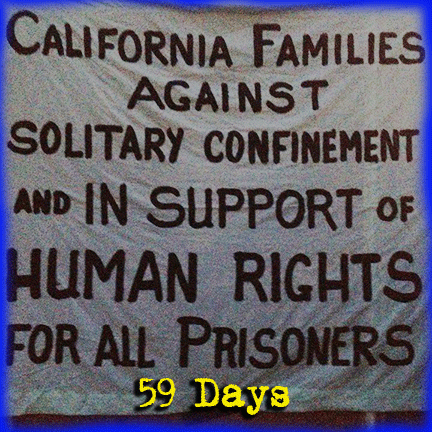The hunger strike that has taken place for nearly two months inside California’s state prisons was declared officially over on Thursday morning.
The strike, which began on July 8 with approximately 30,000 inmates participating had dwindled down to about a hundred core strikers who had refused solid food for 59 days to protest the conditions in which inmates were held in solitary confinement for years, and in certain cases decades, at a time. Some of the inmates in isolation were known gang leaders, but in other cases the reasons for being sent to the SHU (as these segregated l Security Housing Units were called) seemed whimsical at best.
At 8:25 a.m., the California Department of Corrections and Rehabilitation sent out this statement:
As of this morning, all participants of the prison hunger strike have started taking state-issued meals or have otherwise begun the process of re-feeding. California Department of Corrections and Rehabilitation Secretary Jeff Beard issued the following statement today regarding the end of the strike:
“We are pleased this dangerous strike has been called off before any inmates became seriously ill. I’d like to commend my staff and the staff with the federal Receiver’s Office for working together to ensure the health and safety of all employees and inmates was a top priority. CDCR will continue to implement the substantive reforms in California’s Security Housing Units that we initiated two years ago.”
So how did the approximately 100 strikers who lasted until the end get by without….you know….dying?
According to KQED’s Michael Montgomery, the key was Gatorade, plus vitamins. Here’s a clip from Montgomery’s story filed over the weekend. Montgomery has reported extensively on the use of isolation in California’s prison and is one of the small cluster of journalists who followed the strike the most intensively.
Officials monitoring the protest report that, as of Wednesday, the men had body mass indexes in the 20s, well above a danger zone established by the court-appointed receiver overseeing prison medical care. Only two of the prisoners had lost more than 15 percent of their body weight, another critical measure.
While the inmates are clearly suffering as a result of the extended fast, and report bouts of extreme nausea and dizziness, there are “no imminent health emergencies and no prisoners in critical condition,” said Joyce Hayhoe, a spokesperson for receiver Clark Kelso.
So what’s keeping the hunger strikers from more severe starvation? The answer, it turns out, could be mass quantities of Gatorade, the ubiquitous sports drink.
Under state rules, inmates are considered on hunger strike if they refuse all state meals for more than three days and have no other food items in their cells, such as snacks from the prison commissary.
However, Hayhoe said each day the hunger strikers are receiving five powder packets of Gatorade that deliver a total of 600-625 calories. That’s in addition to supplies of vitamins.
Hayhoe said the electrolytes in Gatorade are not considered “nutrition,” which would otherwise cancel inmates’ participation in a hunger strike.
While the CDCR refused to negotiate with the strikers—at least in any public way—two state legislators have called for hearings in October on the strikers demands, writes Alex Dobuzinskis of Reuters.
“I am gratified that the hunger strike has ended without further sacrifice or risk of human life,” state Senator Loni Hancock, a Democrat and one of the two legislators who called for the hearings, said in a statement.
“The issues raised by the hunger strike are real – concerns about the use and conditions of solitary confinement in California’s prisons – and can no longer be ignored,” she said.
Democratic Assemblyman Tom Ammiano, the other legislator who called for the hearings, said in a statement, “I’m happy that no one had to die in order to bring attention to these conditions.”
As we’ve noted in the past, some of the best reports on the conditions in California’s solitary units and why we should care about this issue is the series of articles by Shane Bauer for Mother Jones. (If you’ll remember, Bauer is a journalist who spent 26 months in isolation in an Iranian prison.)
We will, of course, continue to report on the issue as the hearings commence.
FYI: Yes, this qualifies as breaking news.

